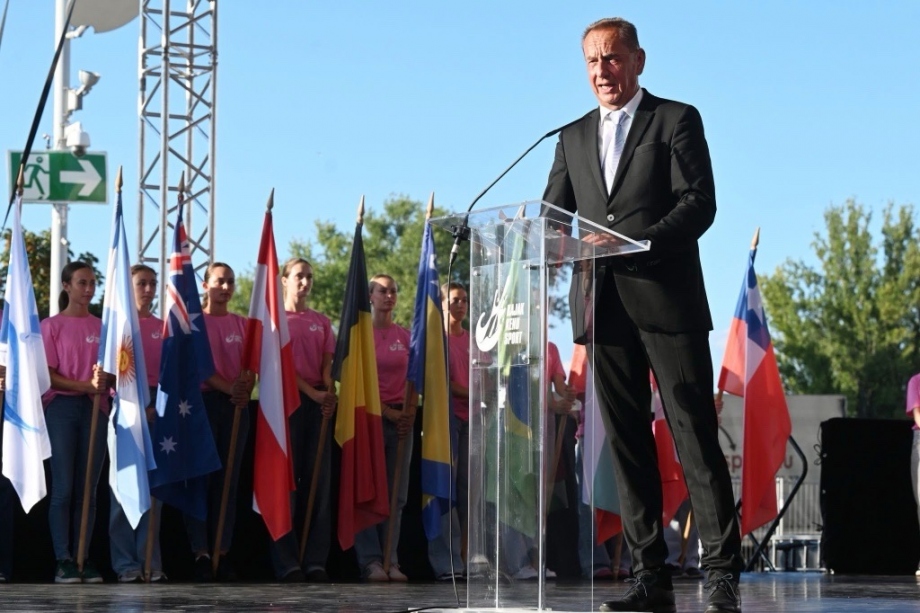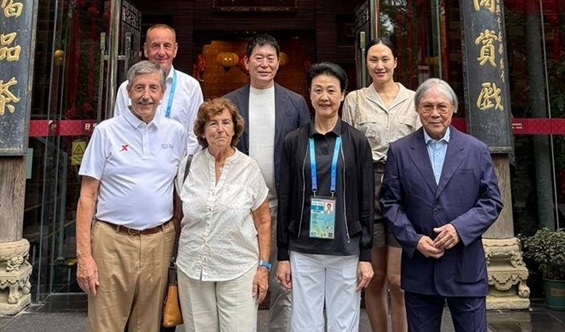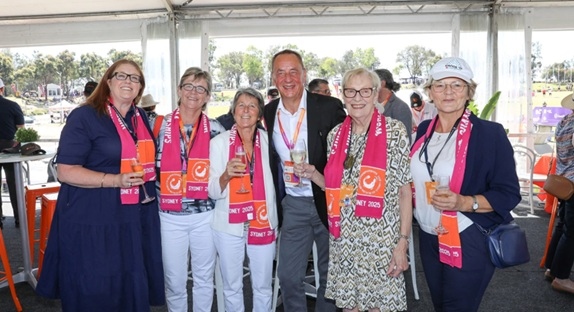President's Message Q3 2025

Dear ICF Family,
What a wonderful summer we have had for paddle sport, filled with thrilling competitions, unique experiences, and important progress across all our disciplines. I am deeply proud of what we have achieved together, from strengthening our sport’s global presence to building new partnerships and opportunities for athletes and fans around the world.
Olympic Qualification System for LA28
After more than two years of dedicated work by our working group, and with the valuable support of our National Federations and stakeholders, the Olympic Qualification System in Canoe Sprint for the Olympic Games Los Angeles 2028 has been approved by the ICF Board of Directors and is now ready for submission to the IOC for final approval. The new system not only ensures a fair pathway for all paddlers to reach the Olympic stage but also enhances the importance and visibility of our competitions.
In accordance with the previously established policy to involve the stakeholders, a meeting with Canoe Slalom coaches took place in Penrith during the Slalom World Championships, where valuable comments on the slalom system were also made. The working group is now in the final stages of presenting the final Canoe Slalom Olympic Qualification version to the Board. The Olympic Qualification System for Paracanoe is also nearing final approval.
I would like to sincerely thank everyone involved in this long yet transparent process for your commitment, constructive dialogue, and invaluable contributions.

Expanding our playground
In Columbus, Georgia, we proudly launched the ICF’s inaugural Centre of Excellence designation for Canoe Freestyle. This milestone will serve as a model for developing whitewater disciplines with a focus on freestyle and wildwater circuits for the next decade, as well as coaching and training opportunities for youth and adult athletes. The recognition reflects Columbus’s long-standing commitment to Canoe Freestyle and its role as a launchpad for the next generation of world-class kayakers.

Meanwhile, our Centre of Excellence in Hangzhou continues to grow. Leveraging the Asian Games legacy, the centre hosted a TIP camp also financially supported by Hangzhou City, enabling almost 50 athletes from various countries to receive professional training for an entire month. These camps will be held regularly and expanded in scale, forming part of a long-term development plan in the region in connection with our Hangzhou office and Super Cup initiatives.
We are also witnessing the launch of new venues that will expand opportunities for our sport worldwide. In Kazakhstan, I joined the inauguration of an international-standard Canoe Sprint course located in the city centre of Turkestan. A coaching seminar has already taken place, and we look forward to bringing international competitions and training camps there soon to benefit the local paddlers and the ones in neighbouring countries. In Korea, following my visit last year, the construction plan for the country’s first Canoe Slalom stadium in Ulsan Sports Park has now been confirmed. The facility will feature a 260-metre-long, 15-metre-wide main course with seating for 15,000 spectators, and is expected to be completed by 2028. In Baku, the ICF is actively supporting the National Federation and the Ministry of Sport of Azerbaijan in planning the country’s first Canoe Slalom course.
Celebrating the competitive summer
This summer offered an exceptional season for our paddlers and fans, with world-class competitions taking place nearly every weekend. Each organising team delivered unique experiences through their professionalism and dedication, setting new standards for event delivery.
At The World Games in Chengdu, paddle sport disciplines, including Dragon Boat, Canoe Polo, and Canoe Marathon, were among the highlights. For the first time, three canoeing disciplines featured in this multi-sport event. All competitions were sold out and received excellent presentation and visibility.

Our two flagship events, the Canoe Sprint World Championships in Milan and the Canoe Slalom World Championships in Penrith, were both tremendous successes. Beyond the outstanding event delivery, they featured important side programmes such as the second edition of the ICF Women’s Symposium, the inaugural Athletes’ Branding Workshop, and the concluding conference of the Developing Environmental and Circular Knowledge (DECK) project.

We also successfully hosted:
- Junior and U23 Wildwater Canoeing World Championships in Solkan
- Junior and U23 Canoe Slalom World Championships in Foix
- Wildwater Canoeing World Cups in Banja Luka and Skopje
- Junior and U23 Canoe Sprint World Championships in Montemor-o-Velho
- Canoe Slalom World Cups in Ljubljana and Augsburg
- Canoe Marathon World Championships in Gyor
- Whitewater Canoeing Sprint World Championships in Ceske Budejovice
On behalf of the ICF, I would like to extend my heartfelt thanks to all organising committees, volunteers, sponsors, and everyone who contributed to the success of these events.
During the World Championships in Milan and Penrith, the election for the ICF Athletes’ Committee for the 2025–2029 term took place. We are pleased to welcome Michal Martikan (Slovakia), Amalie Hilgertova (Czechia), Katie Vincent (Canada), Sebastian Brendel (Germany), Emma Wiggs (Great Britain), and Eslam Jahedi (Iran), who have been elected to the ICF Athletes’ Committee. They are true legends and ambassadors of our sport, dedicated to representing all paddlers and contributing to the continued development of paddle sports.
The ICF Board of Directors will soon meet to confirm the remaining two members from the non-Olympic disciplines, following the recommendations of the six elected representatives. Once the full committee is confirmed, the eight-member Athletes’ Committee will convene to elect its Chair, who will serve as a member of both the ICF Executive Committee and the ICF Board of Directors.
Strengthening our partnerships
In Shenzhen, I had a productive meeting with the leadership of BYD, where we agreed to continue our long-term collaboration in promoting paddle sport, particularly Dragon Boat. In Hangzhou, supported by the ICF Hangzhou Office, we showcased paddle sport disciplines during the APSARA Conference and further strengthened our partnership with Alibaba Cloud.

I am also very pleased to welcome Jiangyun Technology as a new gold level partner of the ICF. Together, we will develop new equipment and technology for virtual competitions, expanding the reach and innovation of our disciplines. Our team remains committed to working closely with all partners to enhance the value and visibility of our sport, creating mutual benefits for our athletes, our development programmes, and our partners’ business interests.
Sport development
Together with John Edwards, we gave an impactful presentation on Paracanoe at the General Assembly of the Asian Paralympic Committee in Astana, aiming to strengthen the sport’s position within the Asian Para Games and other multisport events.

I also joined the IDBF World Championships in Brandenburg an der Havel at the invitation of President Claudio Schermi. Our exchange reaffirmed our shared understanding that we are one family living in two houses. We remain committed to maintaining our strong relationship based on trust and friendship, ensuring that our athletes and participants enjoy the best possible stage for their sport.
In Hangzhou, we have re-emphasised the importance of education with new development initiatives. In partnership with Zhejiang University, we launched the ICF Sports Education Centre, dedicated to paddle sports development and research. This initiative reflects the growing importance of integrating academic expertise into the evolution of our sport, fostering innovation, knowledge exchange, and long-term advancement.

We have also established a promising partnership with Dingwe Academy, a leading international school that will officially include paddle sports in its curriculum with a focus on grassroots development.
Despite many administrative challenges, the renovation of our new headquarters in Budapest has been completed and our employees can now leave their temporary offices.
The administrative hurdles for obtaining a work permit for non-EU foreigners are significant, so some of our new employees still need time to complete this process. In various work meetings in Budapest in September and October with the Secretary General, we discussed the next steps to offer a comprehensive service to our NFs as quickly as possible.
Richard and I had a productive conversation with the ASOIF President in October about preparations for the Olympic Games in LA and the evaluation of the Games in Paris.
Through all these activities and milestones, we continue to strengthen our community, broaden our horizons, and pave the way for a sustainable and inclusive future for paddle sport worldwide.
Last but not least, I would like to share some wonderful news: our Olympian colleague Sebastian Cuattrin is now a world record holder, having paddled the 198.5k stretch of the River Thames from Lechlade, Gloucestershire, to London.
This achievement is truly inspiring, and I would like to encourage not only our paddlers to continue striving for excellence, but also all our colleagues and professionals in the canoeing community to pick up a paddle after work and experience more regularly the joy of our sport firsthand.
By Thomas Konietzko, President of the International Canoe Federation


